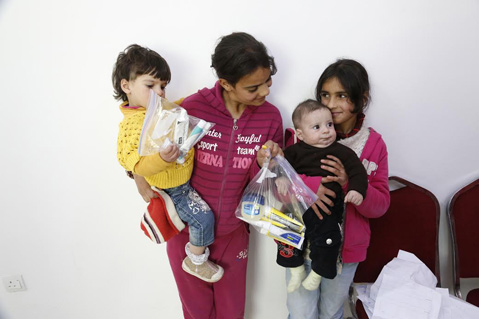Direct Relief Bolsters Health in Refugee Host Countries
Legacy of Aid Comes Full Circle in Local Humanitarian Org

William Zimdin left a profound legacy of human compassion for refugees. An industrial mogul in Estonia before World War II, Zimdin fled to the United States after Hitler targeted him for refusing to fund the war. Stripped of the majority of his assets, he restarted life in Santa Barbara. Soon after, he funded the passage of Hungarian-born Dennis Karczag, who was being held at a war refugee camp, to Santa Barbara.
The two business partners received letters from friends and family who asked for help fleeing Eastern Europe and seeking shelter from the war. Zimdin’s supportive responses to their letters marked the beginning of a foundation run out of their pantry. Since its founding as the William Zimdin Foundation in August 1948, and after years of responding to post-war crises and health emergencies around the world, Direct Relief has become one of the largest nonprofits in the country.
“It’s an awesome story,” said Andrew MacCalla, Director of International Programs and Emergency Response for Direct Relief, “and extremely relevant today, when Direct Relief is responding to the largest refugee crisis since World War II.”
“We dug up materials from Direct Relief archives, like pieces of writing and marketing tools to garner support for World War II refugees,” said Tony Morain, Communications Director for Direct Relief. “It’s almost exactly the same things we are talking about today.“
Based in Goleta, Direct Relief works to improve health in the lives of people affected by poverty or emergencies. The nonprofit focuses on emergency preparedness and response, disease prevention and treatment, maternal and child health, and strengthening health systems in American communities and worldwide.
In response to the refugee crisis, Direct Relief has delivered unprecedented medical support to the region. Medicine and medical supplies donated by the nonprofit support roughly 30,000 people outside refugee camps in Turkey, 500 health facilities in Lebanon, and eight hospitals in Jordan. Medical supplies are shipped to Greece and now Macedonia, as well as to long-standing camps in the West Bank and Gaza.
Morain and MacCalla stress the importance of community health solutions. High cost, chronic health issues such as diabetes, hypertension, and mental illness are beginning to overburden health systems in countries that host refugees, such as Jordan and Lebanon. In Jordan, nearly 25 percent of the population are refugees. In Lebanon, refugees constitute almost a third of the population.
“Just like in the U.S, these are the most expensive problems. The later they are treated, the more resources they will require,” said MacCalla. He recently returned from a mission trip to Jordan, in which Direct Relief partnered with Unilever’s Vaseline brand to conduct dermatological outreach in the Zaatari refugee camp in Syria for people with skin-related injuries, infections, or diseases. “Jordan has the trained professionals and health system structure, but they are totally overwhelmed,” said MacCalla.
After the trip to Jordan, MacCalla brought Rita Zawaideh, CEO and president of the Jordanian refugee health organization Salaam Cultural Museum, to a Direct Relief-supported community health clinic in New York. “There were refugees from Syria at the clinic,” he said, “and Zawaideh said, ‘this is exactly what we’re doing in Jordan.’ Community health work in this country is a health savior. It stopped Ebola, and it is being done in countries receiving refugees, but they need more support in the countries receiving refugees.”
Gordon Wilcock, Direct Relief’s Emergency Preparedness and Response Manager, sees a gap in the way refugee needs are perceived in the U.S. versus refugees’ actual needs. “You’ve got the crisis in Greece — people dying on the voyage. You’ve got refugee camps. You’ve got people still stuck in Syria, and it’s changing constantly. I think the West’s assumption is that people are trying to get to Europe, but in reality the majority of people just want to go home.”
To allow refugees to return home when the political mess is solved, Direct Relief staff concludes, people need to be healthy enough to rebuild their country. Citizens of host countries must not suffer from strain on their health system from refugees; this is the biggest challenge.


